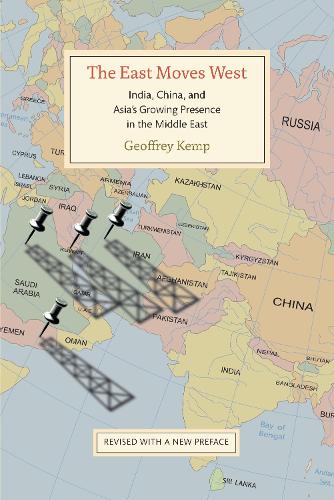
The East Moves West: India, China, and Asia's Growing Presence in the Middle East
(Paperback, Second Edition)
Available Formats
Publishing Details
The East Moves West: India, China, and Asia's Growing Presence in the Middle East
By (Author) Geoffrey Kemp
Bloomsbury Publishing PLC
Brookings Institution
14th June 2012
Second Edition
United States
Classifications
Professional and Scholarly
Non Fiction
327.5056
Physical Properties
Paperback
340
Width 153mm, Height 228mm, Spine 21mm
513g
Description
Industrial growth and economic development are exploding in China and India. The worlds two most populous nations are the biggest reasons for Asias growing footprint on other global regions. The increasing size and impact of that footprint are especially important in the Middle East, an economic, religious, and geopolitical linchpin. In this updated edition of The East Moves West, Geoffrey Kemp details the growing interdependence of the Middle East and Asia and projects the likely ramifications of this evolving relationship.
Reviews
" The East Moves West confirms Geoffrey Kemp's reputation as a scholar who combinesa broad geopolitical vision with an extraordinarily detailed knowledge of the manybilateral relationships between so many Middle East countries, on the one hand, andso many Asian powers, on the other. It will be of great value to policymakers, journalists,scholars, and students." Middle East Policy
|"Geoffrey Kemp has written a book of startling originality. Much is said about a "new"Middle East, and here it is, India and China pushing westward into the Persian Gulf andthe Mediterranean. This is strategic and political analysis of the highest order." Fouad Ajami, professor and director of Middle East Studies,Johns Hopkins University
|"Kemp offers an effective and broad survey of the Asian-Middle East-America nexuswhich covers new ground and offers a wealth of information, data, and analysis. Hisbook should benefit area specialists and policymakers who seek to understandthe Asian role in the Middle East and the dynamics between rising powers and thequasi-hegemon." Middle East Journal
|"Kemp adeptly steers the reader through the ties that bind Asia together, from thegeostrategic importance of Central Asia to the big players China, India, Pakistan, Japan,and South Korea." Executive (Lebanon)
|"As any reader watches the inexorable swing of Gulf oil exports from the west to theeast, this volume should be perused to provide a far fuller picture. Key events are dissected thoroughly and the political implications considered." Ewan W. Anderson, in the Mackinder Forum
Author Bio
Geoffrey Kemp is the director of Regional Strategic Programs at the Nixon Center in Washington, D.C. He served in the White House under Ronald Reagan, as special assistant to the president for National Security Affairs and senior director for Near East and South Asian Affairs on the National Security Council staff. Prior to his current position, he directed the Middle East Arms Control Project at the Carnegie Endowment for International Peace. He is coauthor of Strategic Geography and the Changing Middle East (Carnegie).
